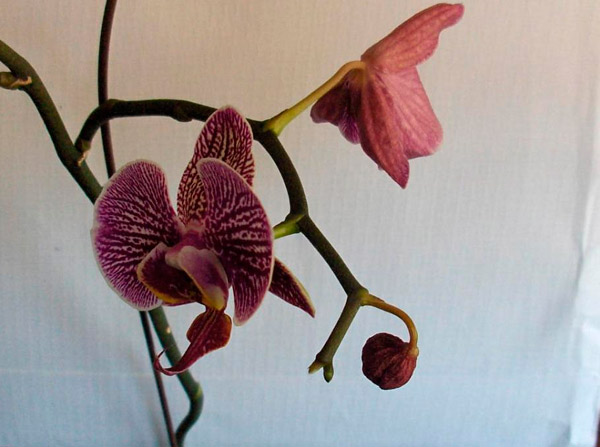Why orchid buds fall off?
Last reviewed: 11.03.2025

The dropping of buds on orchids is a common issue that often worries plant owners. This can happen for a variety of reasons, and it’s important to understand why orchid buds fall off, especially if they haven’t bloomed yet. In this article, we’ll thoroughly examine the main causes of this phenomenon and offer solutions to help you solve the problem.
Why do orchid buds fall off?
There are several factors that can lead to orchid buds falling off. One of the primary causes is stress to the plant. Like all plants, orchids respond to changes in their environment. Let’s explore the most common reasons why orchid buds fall off, especially those that haven't fully opened.
1. Changes in growing conditions
Orchids are sensitive to sudden changes in their environment. They react strongly to fluctuations in temperature, humidity, and light. One of the most common reasons for buds falling off is moving the plant to a new location or abrupt changes in environmental conditions. For instance, if you’ve moved the orchid to a darker spot or a room with different temperatures, the plant may experience stress, leading to bud drop.
2. Lack of light
Insufficient light is one of the most common causes of orchid bud drop. Orchids require bright, indirect light. If the plant is placed in too dark a spot or exposed to too much direct sunlight, it may begin to drop buds. It’s important to provide the orchid with the right level of light, as inadequate lighting slows down the blooming process and may cause premature bud fall.
3. Incorrect watering
Overwatering or underwatering is another frequent cause of orchid bud drop. Both overwatering and underwatering stress the roots, which can lead to bud drop. Make sure to check the moisture level of the substrate and water your orchid only when the top layer of the soil has dried. Overwatering can also lead to root rot, making the orchid more vulnerable to stress and bud drop.
4. Excessive fertilizers
An excess of fertilizers can cause stress to the plant, which can lead to bud drop. When orchids receive too many nutrients, they undergo stress, resulting in various issues, including the shedding of buds. It’s essential to fertilize orchids only during the growing and flowering periods, and use fertilizers specifically formulated for orchids. Overuse of fertilizers can lead to salt buildup in the substrate and root damage.
5. Repotting orchids
Repotting orchids can be a stressful process for the plant, especially if it occurs during the flowering period. During repotting, the roots get damaged, and the plant experiences stress, which can result in bud drop. It’s best to repot orchids after they have finished flowering or during their dormant phase to minimize stress.
6. Pests and diseases
Certain pests like aphids, scale insects, or spider mites can weaken the plant, causing bud drop. Additionally, orchids may suffer from fungal or bacterial infections, which can also affect their blooming process and cause bud shedding. If you notice pests, treat the plant with the appropriate pest control products.
7. Low humidity
Orchids prefer humid environments. If the air is too dry, especially during the winter months when heating is on, the plant may not get enough moisture, which leads to bud drop. The optimal humidity for orchids is between 50-70%. To increase humidity, you can use a humidifier or place the orchid on a tray with water and stones, allowing the water to evaporate near the plant.
8. Temperature fluctuations
Orchids are very sensitive to temperature changes. Extremely high or low temperatures can stress the plant, leading to bud drop. Temperature fluctuations, such as moving the plant to a spot where it’s exposed to drafts or cold air from an air conditioner or heater, are particularly harmful. The ideal temperature for orchids is 20-25°c during the day and 18-20°c at night.
9. Lack of pollinators
Sometimes, orchid buds fall off due to a lack of pollinators, especially if the plant has not been pollinated during its blooming process. This is common in some orchid species, which may drop buds if pollination doesn't occur.
10. Psychological stress on the plant
Like all plants, orchids can experience psychological stress. This may be caused by changes in their environment or improper care. If an orchid has been in the same place for a long time, and then it’s moved or its watering routine is changed, it may experience stress that leads to bud drop.

What to do if orchid buds are falling off?
If you notice that your orchid’s buds are falling off, the first step is to analyze the growing conditions. Try to identify what might be causing the stress and take steps to eliminate the problem.
1. Check the lighting
Ensure that your orchid is receiving the right amount of light. If the light is insufficient, move the orchid to a brighter spot, avoiding direct sunlight. Use artificial lighting if natural light is inadequate.
2. Adjust watering
Check if you are overwatering or underwatering the plant. Orchids prefer moderately moist soil, so water the plant only when the top layer of the soil is dry. Make sure the pot has good drainage to prevent water from accumulating at the bottom.
3. Check temperature and humidity
Orchids are sensitive to temperature changes, so keep the plant away from drafts or heating sources. Also, monitor the humidity level, especially in winter. If the air is too dry, use a humidifier or place the orchid on a humidity tray.
4. Avoid repotting during flowering
If your orchid has started flowering, avoid repotting it at this time. Repotting during blooming can stress the plant and lead to bud drop.
5. Pest control and proper fertilization
Check the plant for pests and treat it accordingly. Also, make sure you are not overfertilizing the plant. Use orchid-specific fertilizers and follow the recommended dosage.
Conclusion
The dropping of buds on an orchid is a sign that the plant is experiencing stress. By applying the correct care techniques and addressing the underlying causes of bud drop, you can help your orchid recover and continue to bloom beautifully. The key is to closely monitor the plant's environment and respond to any changes to prevent further issues.
